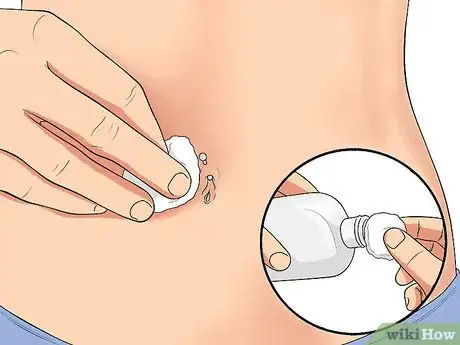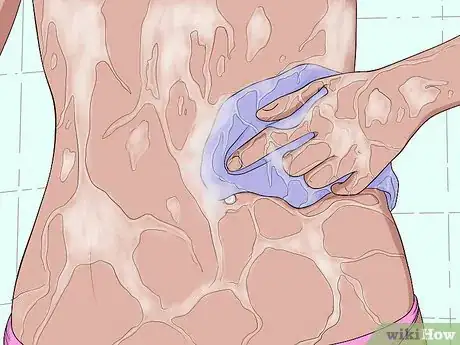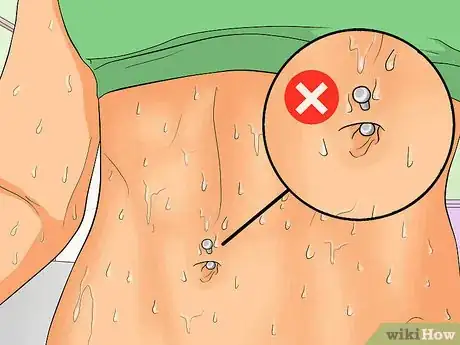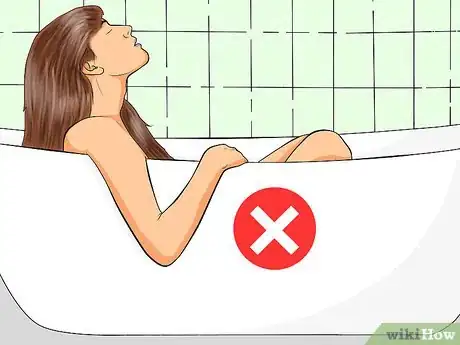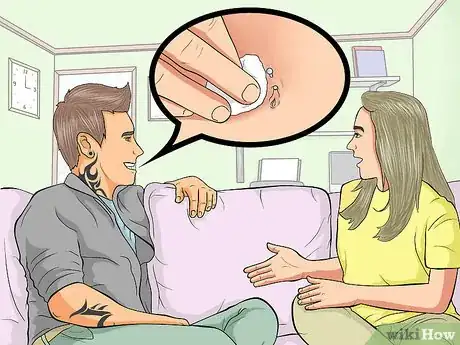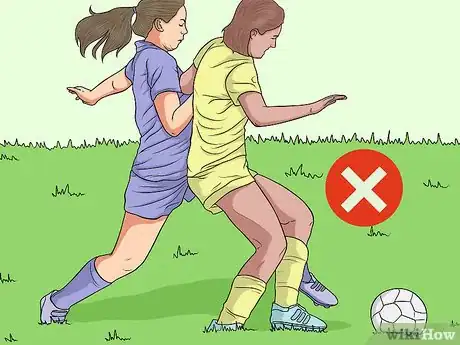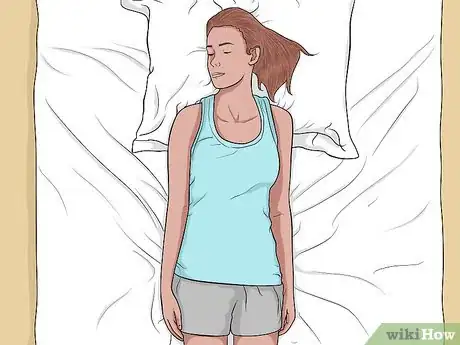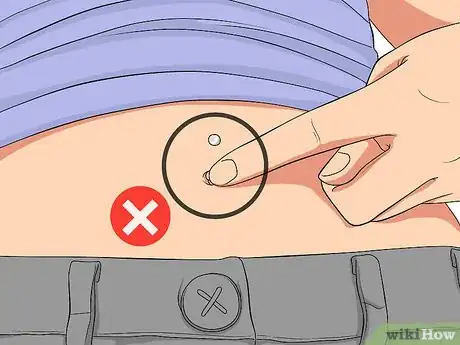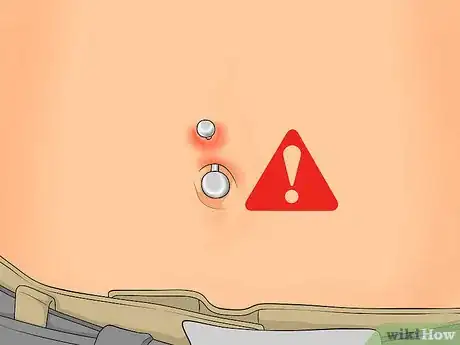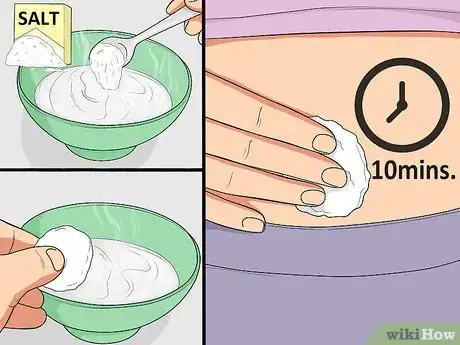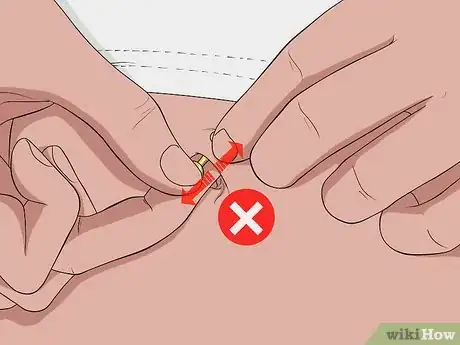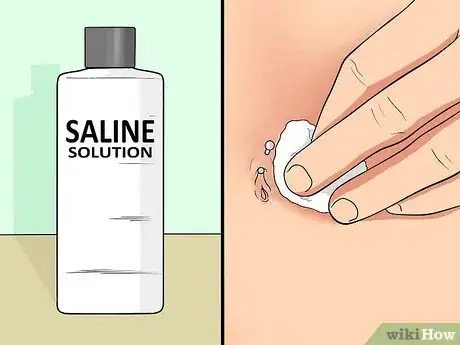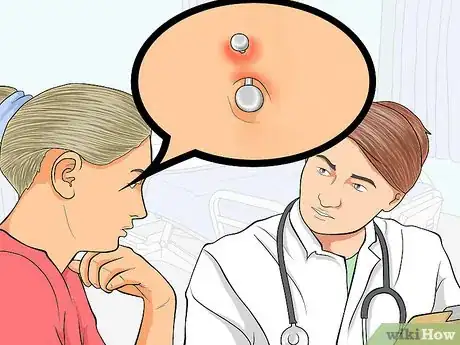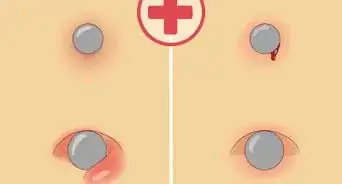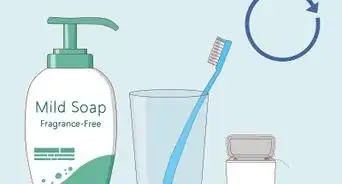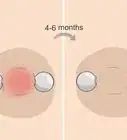This article was medically reviewed by Sarah Gehrke, RN, MS. Sarah Gehrke is a Registered Nurse and Licensed Massage Therapist in Texas. Sarah has over 10 years of experience teaching and practicing phlebotomy and intravenous (IV) therapy using physical, psychological, and emotional support. She received her Massage Therapist License from the Amarillo Massage Therapy Institute in 2008 and a M.S. in Nursing from the University of Phoenix in 2013.
There are 9 references cited in this article, which can be found at the bottom of the page.
This article has been viewed 509,590 times.
While your belly button piercing heals, it’s important to avoid physically irritating the area. Additionally, preventing infection is vital to minimizing the amount of irritation associated with your piercing. The most important aspect of preventing and treating infection in a belly button piercing is thorough cleaning. You can also minimize the irritation associated with an infection by protecting and disinfecting your piercing.
Steps
Keeping Your Piercing Clean
-
1Clean the piercing daily. Regular cleaning is the best way to speed up the healing process after receiving a piercing. This will reduce the amount of time that your belly button is tender and easily irritated. Regular cleaning will also help prevent serious irritants such as infection.[1]
- After washing your hands with soap and warm water,[2] use a Q-tip or cotton ball dipped in saline solution or mild antibacterial soap to wash both holes made by the piercing, as well as your belly button.
- Gently rotate your piercing about four times around after washing.
- To make your own saline solution, mix a half a teaspoon of salt into a cup of warm water.
- Continue washing your piercing and the surrounding area once or twice daily until the redness, swelling, and discharge that normally follow a belly button piercing subside.
-
2Wash the piercing every time you shower. Once the belly button piercing has healed, it’s still important to wash it regularly. Showering is the recommended method of washing, as bathtubs can harbor bacteria that may infect your piercing.[3]
- Do not use a washcloth or loofah to clean your belly button piercing. These can harbor bacteria and may pull or otherwise irritate your piercing.
- Use a gentle soap to wash both holes of your piercing, as well as your belly button and the surrounding area.
- Allow water from the shower to simply wash the soap away.
Advertisement -
3Do not allow body fluids to touch the piercing. One common irritant and potential source of infection for belly button piercings is bodily fluid. This includes your own or other people’s fluids. Avoid getting saliva, sweat, and any other bodily fluid on or around your belly button piercing.[4]
- When you sweat, be sure to wash your belly button piercing at your earliest convenience.
-
4Stay out of bodies of water. Do not get in a pool, hot tub, or natural body or water while your belly button piercing is healing or infected. Even a clean, well-maintained, and chemically-treated pool may still contain bacteria that can cause an infection or prolong healing.[5]
-
5Follow cleaning directions. After receiving your piercing, the professional that gave it to you will direct you on how to properly clean the piercing and help it heal. Be sure to remember everything they tell you, and write their directions down if you may forget.
- If you experience unpleasant symptoms or an infection associated with your piercing, call the business where you received the piercing and ask what they recommend for treatment.
Minimizing Physical Irritation
-
1Avoid contact sports for two weeks. Your belly button piercing will be especially susceptible to irritation for the first few weeks you have it. During this critical healing period, avoid any activities that involve physical contact. More to the point, avoid any strenuous exercise that may disrupt the healing process.[6]
- Do not play team sports, such as soccer or basketball, until your piercing is fully healed.
- Avoid activities that involve extensive stretching for two weeks as well, such as climbing and yoga.
-
2Wear loose shirts. Very small amounts of chafing or abrasion can irritate your belly button. Especially during healing periods after a new piercing or following an infection, wear loose-fitting clothing that will not constantly rub or apply pressure to your piercing.[7]
-
3Try to sleep on your back. It’s important to prevent irritating your belly button while you sleep. While sleeping on your side is fine, sleeping on your back is best. Most importantly, avoid sleeping on your stomach.[8]
-
4Don't fiddle with your piercing. Fiddling with your belly button can cause it to become irritated, and may even contribute to an infection. In particular, avoid absent-minded touching or tugging on your belly button piercing.[9]
- When you want to adjust your jewelry or touch the area for another reason, be sure to wash your hands before doing so.
Treating an Infection
-
1Recognize signs of an infection. The area around a new piercing may be red, tender, and/or swollen for a few weeks. However, if these symptoms last more than three weeks, they may indicate an infection. Similarly, yellow discharge is normal for about a week after getting a belly button piercing. If discharge continues, turns green, or includes blood, this likely indicates an infection.[10]
- Other indications of an infection include excess crust around one or both of the piercing’s holes, persistent pain or soreness to the touch, skin sensitivity, the ability to see the piercing through the skin, or any movement or loosening of the piercing itself.
- If any of these symptoms are present, see you doctor.
-
2Disinfect the area with a saline compress. A saline press is another way to wash and disinfect your belly button piercing that will also reduce pain or other irritation from infection. Dissolve a quarter teaspoon of salt into a cup or so of water that is warm, but safe to touch. Use a cotton ball of piece of clean gauze to soak up the solution. Lie on your back and gently hold the saturated material onto your belly button area for 10 minutes.[11]
- Repeat this process twice a day to help kill bacteria and reduce irritation.
- Dry your belly button with a disposable paper product such as paper towel. A clean towel and gauze are other good alternatives.
-
3Do not remove your jewelry or use an antibacterial ointment. While these actions may be tempting, they may actually prolong the healing process. In fact, removing your jewelry can lead to other health complications. Similarly, antibacterial ointment can inadvertently trap bacteria within the infected area.[12]
-
4Consider supplemental remedies. Tea tree oil,[13] aloe vera,[14] white vinegar, and chamomile tea[15] are all said to have infection-fighting properties as well. While saline solution is the recommended method of disinfecting your piercings, these may offer supplementary relief from irritation and other symptoms of an infection.[16]
- Aloe vera gel can help soothe an irritated belly button and may even help prevent scarring. Get aloe vera gel from your local pharmacy.
-
5See a doctor for a serious infection. Home treatment may not be adequate to rid your piercing of a persistent infection. If you have an infection that lasts longer than a week, set up an appointment to see your doctor.[17]
- If your belly button gets especially swollen, is significantly painful, and/or continually bleeds or discharges fluid, see your doctor as soon as possible.
References
- ↑ http://share.upmc.com/2015/07/how-to-keep-your-bellybutton-navel-clean-the-right-way/
- ↑ https://www.cdc.gov/handwashing/when-how-handwashing.html
- ↑ http://www.skin-artists.com/navel-piercing-aftercare.htm
- ↑ http://www.skin-artists.com/navel-piercing-aftercare.htm
- ↑ http://www.healthyandnaturalworld.com/infected-belly-button-piercing/
- ↑ http://www.skin-artists.com/navel-piercing-aftercare.htm
- ↑ http://www.skin-artists.com/navel-piercing-aftercare.htm
- ↑ http://www.skin-artists.com/navel-piercing-aftercare.htm
- ↑ http://www.healthyandnaturalworld.com/infected-belly-button-piercing/
- ↑ http://www.newhealthadvisor.com/infected-belly-button-piercing.html
- ↑ http://www.healthyandnaturalworld.com/infected-belly-button-piercing/
- ↑ http://www.newhealthadvisor.com/infected-belly-button-piercing.html
- ↑ https://www.ncbi.nlm.nih.gov/pubmed/12452873
- ↑ https://www.ncbi.nlm.nih.gov/pmc/articles/PMC5198455/
- ↑ https://www.ncbi.nlm.nih.gov/pmc/articles/PMC2995283/
- ↑ http://www.healthyandnaturalworld.com/infected-belly-button-piercing/
- ↑ https://www.webmd.com/beauty/belly-button-piercing
About This Article
The easiest way to treat an irritated belly button piercing is to keep the area clean. To clean your piercing, soak a q-tip or cotton ball with a saline solution and gently wash your piercing holes and belly button twice a day. After cleaning the area, rotate your piercing about 4 times. Avoid getting any body fluids, like sweat or saliva, near your piercing or it might get infected. Whenever you work out, wash your belly button as soon as possible. If you want to make extra sure your piercing doesn't get irritated, wear loose clothing and try to sleep on your back, which will reduce the amount of pressure on your skin. To learn more, like how to treat your piercing if it gets infected, scroll down.
